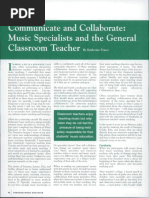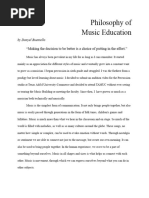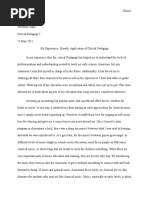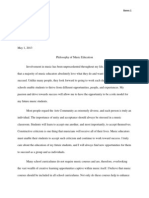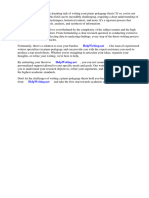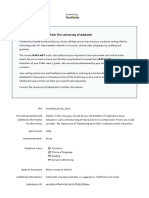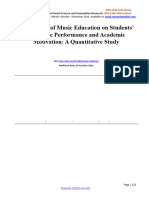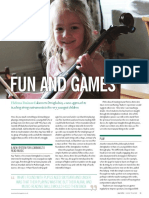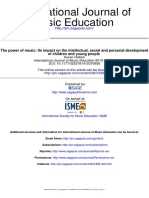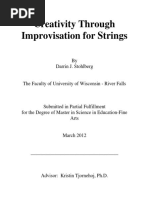0 ratings0% found this document useful (0 votes)
31 viewsMyers
Myers
Uploaded by
api-301442420The document discusses promoting lifelong involvement in music beyond schooling. It summarizes an article by Myers (2007) that argues for freeing music education from being tied solely to schooling and making music education opportunities available to people of all ages in the community. The article uses a survey finding that 90% of parents see arts as important but emphasis declines after grade school. The case of a 48-year-old woman retaking piano lessons is provided as an example of the benefits and different approach needed for adult music education versus teaching children.
Copyright:
© All Rights Reserved
Available Formats
Download as DOCX, PDF, TXT or read online from Scribd
Myers
Myers
Uploaded by
api-3014424200 ratings0% found this document useful (0 votes)
31 views1 pageThe document discusses promoting lifelong involvement in music beyond schooling. It summarizes an article by Myers (2007) that argues for freeing music education from being tied solely to schooling and making music education opportunities available to people of all ages in the community. The article uses a survey finding that 90% of parents see arts as important but emphasis declines after grade school. The case of a 48-year-old woman retaking piano lessons is provided as an example of the benefits and different approach needed for adult music education versus teaching children.
Original Title
myers
Copyright
© © All Rights Reserved
Available Formats
DOCX, PDF, TXT or read online from Scribd
Share this document
Did you find this document useful?
Is this content inappropriate?
The document discusses promoting lifelong involvement in music beyond schooling. It summarizes an article by Myers (2007) that argues for freeing music education from being tied solely to schooling and making music education opportunities available to people of all ages in the community. The article uses a survey finding that 90% of parents see arts as important but emphasis declines after grade school. The case of a 48-year-old woman retaking piano lessons is provided as an example of the benefits and different approach needed for adult music education versus teaching children.
Copyright:
© All Rights Reserved
Available Formats
Download as DOCX, PDF, TXT or read online from Scribd
Download as docx, pdf, or txt
0 ratings0% found this document useful (0 votes)
31 views1 pageMyers
Myers
Uploaded by
api-301442420The document discusses promoting lifelong involvement in music beyond schooling. It summarizes an article by Myers (2007) that argues for freeing music education from being tied solely to schooling and making music education opportunities available to people of all ages in the community. The article uses a survey finding that 90% of parents see arts as important but emphasis declines after grade school. The case of a 48-year-old woman retaking piano lessons is provided as an example of the benefits and different approach needed for adult music education versus teaching children.
Copyright:
© All Rights Reserved
Available Formats
Download as DOCX, PDF, TXT or read online from Scribd
Download as docx, pdf, or txt
You are on page 1of 1
Myers, D. (2007).
Freeing music education from schooling: Towards a lifespan
perspective on music teaching and learning. International Journal of Community Music
1(1): 49-61
Freeing Music Education from Schooling: Toward a Lifespan of Perspective on
Music Learning and Teaching brings up the important issue of how does one promote
lifelong involvement in music. Myers (2007) uses statistics from the Americans for the
Arts survey with the result being that ninety percent of parents believed arts were
essential to a well-rounded education. Though it seems we are very supportive of arts in
the school system, even with budget cuts, it is the societal norm to put less emphasis on
the importance of arts education after grade school. The notion of Freeing Music
Education from Schooling means that Myers (2007) wants equal opportunities for
Music Education to be available for everyone in the community.
I really enjoyed reading this article since its my goal in life, and as an educator to
promote involvement in the arts no matter the age. Last year, I have the pleasure of
working with a woman named Anthea. She was 48 years old and had quit piano at 14
years old after having a horrible experience with a piano teacher. She started lessons
again at 45 years old with her two teenage daughters. I became her teacher in her third
year of lessons and we automatically had a great relationship. It was a great learning
experience for me; a twenty year old who just received her Diploma of Music teaching
someone who could easily be her mother. I quickly learned that unlike teaching children,
working with adults was more of collaboration than anything else. I was able to find out
what I could push her further in and what I had to be more patient in because of her
ability to voice her opinion. One of my advantages in music is that I have a very natural
sense of rhythm, and difficult rhythms are not an issue for me. On the other hand,
rhythm was Antheas weakest skill as a musician. We were able to develop that aspect
of her musicianship while working together because she was able to tell me what
exactly did not make sense to her. On the other hand, I was lenient with practicing
because I could understand that this was just her hobby after being a mother and an
accountant all day. It didnt matter than we went over the same polyrhythm for a couple
weeks because she was just so excited to sit down and try again. I was truly proud of
her for starting lessons again as she told me after a stressful day in the office, she was
relieved that she could sit down at the piano and relief her stress by playing beautiful
music. She is my inspirational for promoting a music education that does not stop after
childhood.
You might also like
- Montessori in The Music ClassroomDocument8 pagesMontessori in The Music Classroomapi-233634229No ratings yet
- Music Education and Social Emotional Learning: The Heart of Teaching MusicFrom EverandMusic Education and Social Emotional Learning: The Heart of Teaching MusicRating: 4 out of 5 stars4/5 (4)
- Vocal, Instrumental, and Ensemble Learning and Teaching - 3 (2018)Document472 pagesVocal, Instrumental, and Ensemble Learning and Teaching - 3 (2018)STELLA FOURLA100% (5)
- Songbooks Formerly All My Loving 25 Arr Sharon R PDFDocument32 pagesSongbooks Formerly All My Loving 25 Arr Sharon R PDFAnonymous JShpvpS33% (3)
- Music Ed Interview 3 Amy Munsell 3 11 22 - Matthew TaborDocument9 pagesMusic Ed Interview 3 Amy Munsell 3 11 22 - Matthew Taborapi-582885486No ratings yet
- Claudia Edwards Enc 2135 Investigative Field Essay Draft 1Document8 pagesClaudia Edwards Enc 2135 Investigative Field Essay Draft 1api-340475177100% (2)
- 1 SaDocument2 pages1 Saapi-329894891No ratings yet
- 1 SaDocument3 pages1 Saapi-336810677No ratings yet
- Assignment Two Post-Workshop DraftDocument12 pagesAssignment Two Post-Workshop DraftTylerGoehringNo ratings yet
- Persuasive Speech Scom-2Document4 pagesPersuasive Speech Scom-2api-584638904No ratings yet
- 1s Gilleland Madsenresearchworksheet Fa23Document3 pages1s Gilleland Madsenresearchworksheet Fa23api-549506338No ratings yet
- Journal2 CopyDocument2 pagesJournal2 Copyqkvwnsp9hbNo ratings yet
- Bryson 1sa Draft 3 Madsen PerspectivesDocument2 pagesBryson 1sa Draft 3 Madsen Perspectivesapi-371675597No ratings yet
- Communicate and Collaborate: Music Specialists and The GeneralDocument5 pagesCommunicate and Collaborate: Music Specialists and The GeneralNettieNo ratings yet
- Music Philosophy PaperDocument6 pagesMusic Philosophy PaperJSFinchNo ratings yet
- Capstone CBL PaperDocument8 pagesCapstone CBL Paperapi-308041347No ratings yet
- Music Philsophy Rebecca AllenDocument9 pagesMusic Philsophy Rebecca Allenapi-207657139No ratings yet
- Philosophy of Music Education - Nathan SteinmullerDocument8 pagesPhilosophy of Music Education - Nathan Steinmullerapi-667814222No ratings yet
- Moriah DRDocument7 pagesMoriah DRapi-534141797No ratings yet
- Professional EssayDocument7 pagesProfessional Essayapi-329766575No ratings yet
- Music Philosophy and AdvocacyDocument5 pagesMusic Philosophy and Advocacyapi-385909587No ratings yet
- MadsenDocument2 pagesMadsenapi-329934174No ratings yet
- Research Into PracticeDocument8 pagesResearch Into Practiceapi-301536744No ratings yet
- Philosophy of Music EducationDocument6 pagesPhilosophy of Music Educationapi-270246827No ratings yet
- Music Philosophy PaperDocument6 pagesMusic Philosophy Paperapi-317408601No ratings yet
- Grade 10 ArticlesDocument5 pagesGrade 10 ArticlesRhenilyn DaduyaNo ratings yet
- 1sa Done Draft GibsonDocument3 pages1sa Done Draft Gibsonapi-330701732No ratings yet
- CCC CC CC CC CCCC C CCCC CCCCC CC CC CC CCCCCCCC CCCCCCCC C CC CCCCCCCDocument4 pagesCCC CC CC CC CCCC C CCCC CCCCC CC CC CC CCCCCCCC CCCCCCCC C CC CCCCCCCKaren Caba CimafrancaNo ratings yet
- Benefits of MusicDocument6 pagesBenefits of MusicShot TimeNo ratings yet
- InterviewDocument2 pagesInterviewLogan BloomNo ratings yet
- Vision StatementDocument4 pagesVision Statementapi-529878715No ratings yet
- Combination Essay On My FutureDocument3 pagesCombination Essay On My FuturenintendomrtNo ratings yet
- Teaching PhilosophyDocument1 pageTeaching Philosophysbrandt5No ratings yet
- Department of Music Adelphi University: Musician & Teacher: Chapter 2Document4 pagesDepartment of Music Adelphi University: Musician & Teacher: Chapter 2Stephen SchultheisNo ratings yet
- Teaching Music in The Elementary GradesDocument6 pagesTeaching Music in The Elementary GradesKenny John SananNo ratings yet
- PhilosophyDocument3 pagesPhilosophyapi-239685212No ratings yet
- MyersDocument2 pagesMyersapi-302835480No ratings yet
- Philosophy of Music Education Sed300Document3 pagesPhilosophy of Music Education Sed300api-744390450No ratings yet
- Philosophy One-PageDocument1 pagePhilosophy One-Pageapi-330896231No ratings yet
- My Philosophy of Music Education: Erin WanderDocument10 pagesMy Philosophy of Music Education: Erin Wanderapi-291483793No ratings yet
- My Philosophy of Music EducationDocument4 pagesMy Philosophy of Music Educationapi-242567850No ratings yet
- Music Dance - Teacher Researcher Portfolio by Rachel Hsieh - PJ 261Document13 pagesMusic Dance - Teacher Researcher Portfolio by Rachel Hsieh - PJ 261api-532470182No ratings yet
- Sonya Bangia - Self Assesment and Professional GoalsDocument5 pagesSonya Bangia - Self Assesment and Professional Goalsapi-532508560No ratings yet
- The Lord Is My SongDocument184 pagesThe Lord Is My SongMúsica Sacra e AdoraçãoNo ratings yet
- Philosophy of Music Education EssayDocument6 pagesPhilosophy of Music Education EssayEmilio Chase100% (1)
- Philosophy FinalDocument5 pagesPhilosophy Finalapi-247159825No ratings yet
- 1302-Essay 1 Final DraftDocument5 pages1302-Essay 1 Final Draftapi-643543921No ratings yet
- A Practical Approach To Understanding Music Theory 1651589281Document115 pagesA Practical Approach To Understanding Music Theory 1651589281Darpan D.No ratings yet
- Tyler Brown Ms. Schweizer English 3 Period 6 25 April 2010: " (Mcdonald, H)Document5 pagesTyler Brown Ms. Schweizer English 3 Period 6 25 April 2010: " (Mcdonald, H)Tyler BrownNo ratings yet
- My Most Influential TeacherDocument2 pagesMy Most Influential Teacherapi-549606705No ratings yet
- Philosophy Music EducationDocument2 pagesPhilosophy Music Educationapi-377158500No ratings yet
- Short Paper Annisa ShafaDocument5 pagesShort Paper Annisa ShafaIan ClaxNo ratings yet
- Music Ed Philosphy StatementDocument7 pagesMusic Ed Philosphy Statementapi-344196311No ratings yet
- music philosophyDocument4 pagesmusic philosophymaria13129344545No ratings yet
- SecondaryphilosophyDocument1 pageSecondaryphilosophyapi-253984328No ratings yet
- Journal Entry 2Document2 pagesJournal Entry 2api-530757562No ratings yet
- PhilosophyDocument4 pagesPhilosophyapi-739228855No ratings yet
- Philosophy of Me 5Document3 pagesPhilosophy of Me 5api-384262754No ratings yet
- 517 FinalDocument6 pages517 Finalapi-313080753No ratings yet
- (Assignment #1)Document2 pages(Assignment #1)Cassandra Nicole AbieraNo ratings yet
- RutherfordDocument2 pagesRutherfordapi-301442420No ratings yet
- BergonziDocument1 pageBergonziapi-301442420No ratings yet
- Tobias 2Document2 pagesTobias 2api-301442420No ratings yet
- BrissonDocument1 pageBrissonapi-301442420No ratings yet
- HouriganDocument2 pagesHouriganapi-301442420No ratings yet
- Annotations Oct 18Document1 pageAnnotations Oct 18api-301442420No ratings yet
- Classroom Man Plan CL 2017Document4 pagesClassroom Man Plan CL 2017CasNo ratings yet
- Smu 331 Music in Secondary School Practicum Syllab 7Document18 pagesSmu 331 Music in Secondary School Practicum Syllab 7api-252249300No ratings yet
- Module 3 Teaching MusicDocument6 pagesModule 3 Teaching MusicvstxllaNo ratings yet
- 00-Music in Early Childhood Teacher Education - Raising Awareness of A Worrisome Reality and PropoDocument12 pages00-Music in Early Childhood Teacher Education - Raising Awareness of A Worrisome Reality and PropoSrikanthi IndriyaniNo ratings yet
- Creating Quality Integrated and Interdisciplinary Arts Programs PDFDocument18 pagesCreating Quality Integrated and Interdisciplinary Arts Programs PDFLouis SpencerNo ratings yet
- Shelley Robinson Pages Final CV 2017Document10 pagesShelley Robinson Pages Final CV 2017api-241740947No ratings yet
- Case Study Assignment 2Document10 pagesCase Study Assignment 2api-408336810No ratings yet
- Journals Impact FactorsDocument92 pagesJournals Impact FactorsBen JamesNo ratings yet
- Piano Pedagogy ThesisDocument5 pagesPiano Pedagogy ThesisBuyCheapPaperOnlineUK100% (1)
- Creativity EssayDocument7 pagesCreativity EssayBilly James St JohnNo ratings yet
- 14-15 TDP HandbookDocument28 pages14-15 TDP Handbookapi-266268398No ratings yet
- Classical Bachelor Study Guide 2016-2017 PDFDocument247 pagesClassical Bachelor Study Guide 2016-2017 PDFDaniel AlbertoNo ratings yet
- Claudine Avalos-Current ResumeDocument2 pagesClaudine Avalos-Current Resumeapi-287036010No ratings yet
- Practice Teaching PortfolioDocument88 pagesPractice Teaching PortfolioChloe Eliot HMNo ratings yet
- The Impact of MusicDocument5 pagesThe Impact of Musicdolorfojanine99No ratings yet
- Music ReflectionDocument15 pagesMusic Reflectionapi-333629585No ratings yet
- Harare Timetable v6Document31 pagesHarare Timetable v6tindowsmNo ratings yet
- Levi Block Resume No AdDocument2 pagesLevi Block Resume No Adapi-656667235No ratings yet
- Music PedagoguesDocument24 pagesMusic PedagoguesDipesh Tripathi100% (1)
- Music Teacher Stringbabies2012Document2 pagesMusic Teacher Stringbabies2012TinaNo ratings yet
- Persuasive SpeechDocument3 pagesPersuasive Speechapi-248715362100% (1)
- Mahoney Erika Onlineresume2019Document2 pagesMahoney Erika Onlineresume2019api-336348995No ratings yet
- Power of Music PDFDocument22 pagesPower of Music PDFPablo CastilloNo ratings yet
- Etude Theme: Frederic ChopinDocument1 pageEtude Theme: Frederic ChopinRivka SloboderNo ratings yet
- ABRSM Diploma Reading ListDocument31 pagesABRSM Diploma Reading ListZY HuangNo ratings yet
- The Effects of Embouchure and Breathing Instruction On Beginning Brass Students' PerformanceDocument180 pagesThe Effects of Embouchure and Breathing Instruction On Beginning Brass Students' PerformancesulumanNo ratings yet
- Creativity Through Improvisation For StringsDocument133 pagesCreativity Through Improvisation For StringsRobert Daniels100% (2)













